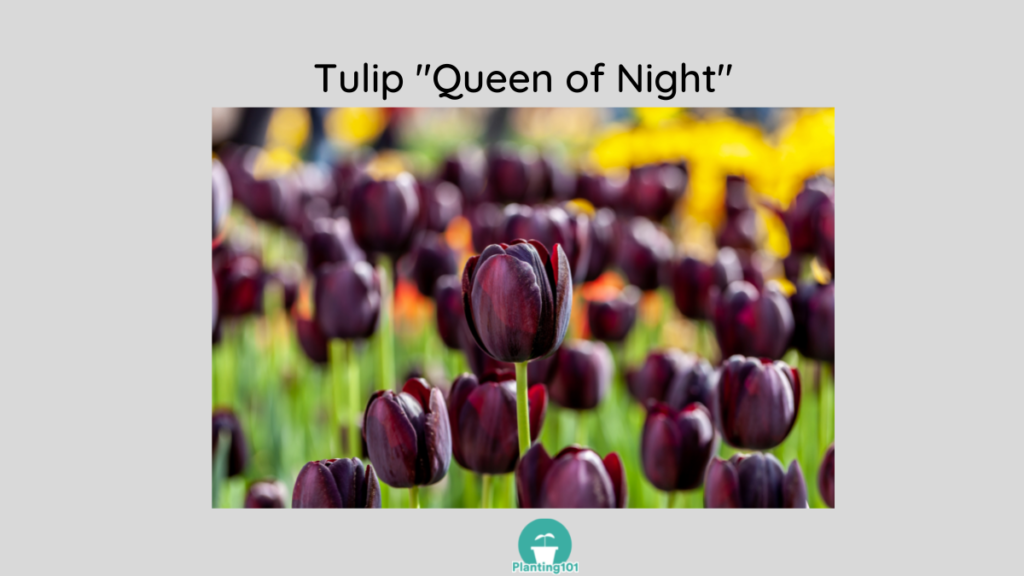Tulip ‘Queen of Night’ (Tulipa ‘Queen of Night’) is a stunning tulip variety with flowers that looks black. The flowers are actually deep maroon. It’s an impressive variety that will look amazing in any garden. Here is a beginner’s guide on how to care for your Tulip ‘Queen of Night’.

Tulip ‘Queen of Night’ Planting Basics
| Name | Tulip ‘Queen of Night’ |
| Botanical Name | Tulipa ‘Queen of Night’ |
| Flower Color | Maroon |
| Height | 22-24 inches |
| Sun | Full (6+ hours sun per day) |
| Soil | Well drained |
| Bloom Time | Late |
| Zones | 3-8 |
| Plant Depth | 5 inches |
| Plant Spacing | 4 inches apart |
| Density | 5 per sq. ft. |
Tulip ‘Queen of Night’: Size
Tulip ‘Queen of Night’ grows to 22-24 inches tall.
Planting Your Tulip ‘Queen of Night’
Where to Plant Tulip ‘Queen of Night’ (Tulipa ‘Queen of Night’)
Tulips are happiest in full sun locations. They need to be planted in sunny locations otherwise your tulips will not flower. Tulips bloom best in a sunny location that receives at least 6 hours of sunlight. Plant your tulips in soil with good drainage preferably with pH level of 6-6.5.
| Sun | Full (6+ hours sun per day) |
| Soil | Well drained |
How to Plant Tulip ‘Queen of Night’
1. Prepare the soil first before planting your tulip bulbs.
2. Add compost and bulb fertilizer to the soil.
3. Loosen and aerate the soil to 8 inches below the surface.
4. Plant tulip bulbs 3x the height of your tulips. If you have deer, rabbits and squirrels in your garden, you need to plant tulip bulbs at least 8 inches deep. If your tulip bulbs are planted too shallow, they will not flower.
Use a bulb planter tool to make planting your bulbs easier.
When is the Best Time to Plant Tulip ‘Queen of Night’?
The best time to plant your tulips is in the Fall. However, if you purchased bulbs on sale late in the season, you can still plant your tulips. Make sure you plant your tulip bulbs before the soil freezes.
How Many Tulip ‘Queen of Night’ Bulbs to Plant in a Flower Bed?
You can plant 5 Tulip ‘Queen of Night’ bulbs per square foot. Use the Bulb Planting calculator below to calculate how many bulbs you need for your garden.
How to Choose Healthy Tulip ‘Queen of Night’ to Plant?
It’s important to start off with healthy tulip bulbs to ensure blooming success. Don’t waste your time and energy planting bad tulip bulbs. How to tell when tulip bulbs are bad? Bad tulip bulbs will float in water while healthy bulbs will sink. Also, make sure to inspect your tulip bulb, the papery outer covering should be intact.
How to Care for Your Tulip ‘Queen of Night’
Do You Need to Water Your Tulip ‘Queen of Night’ every day?
Water your tulips a few times a week in the Spring when it is growing. When you water your tulips, avoid watering from the top, don’t wet the petals, since it will cause the petals to burn and spot.
Stop watering your tulips in the summer when your tulips are dormant. Tulips need dry conditions during dormancy. The amount of water it receives from regular rainwater is sufficient during the summer months.
What to Do with Your Tulip ‘Queen of Night’ After They Bloom?
You need to deadhead your tulips after it blooms. Deadhead your tulips by cutting off the top 3 inches of the flower stem. Make sure you cut below the seed capsule. Don’t cut the yellowing leaves though. Leave the foliage for at least 6 more weeks, until it turns brown and withers completely.
The reason why you don’t cut off tulips’ leaves is that it is still continuing to absorb moisture and sunlight to feed the bulb. You need the bulb fed so it will bloom nicely the following year.
If there are bulbs that failed to bloom or did not bloom nicely, you can remove these and plant fresh bulbs in the Fall.
How Often Should You Fertilize Your Tulip ‘Queen of Night’?
You should fertilize your tulips in the early Spring when the shoots emerge. Fertilize again in the Fall before the first snowfall. For newly planted tulips, fertilize at planting and then again in the early Spring.
What Fertilizer Should You Use on Your Tulip ‘Queen of Night’?
Use a fertilizer formulated specifically for bulbs. You can also use bonemeal on your tulips.
Tulip ‘Queen of Night’: Cut Flower Tips
When to Harvest Your Tulip ‘Queen of Night’ for Cut Flowers?
The best time to cut your tulip flowers is in the morning. You can cut your tulips when the buds are green and let them bloom in the vase or you can cut your tulips when its in full bloom.
Troubleshooting Your Tulip ‘Queen of Night’
Is Tulip ‘Queen of Night’ Deer Resistant?
Deer and squirrels love to munch on tulip bulbs. One way to prevent deer and squirrels from destroying your tulips is by planting tulip bulbs near Daffodils. Deer and squirrels dislike daffodils. Planting your tulips near daffodils will discourage them from munching on your tulips. You can also try sprinkling bone meal around the bulb plantings. Another deer and squirrel deterrent is to lay a sheet of chicken wire (1-inch opening) over the bulbs. This will prevent squirrels and deer from getting to your tulip bulbs.
What are the common problems of your Tulip ‘Queen of Night’?
Common problems for your tulips are blight, virus, and aphids. If you see streaks on the foliage, sickly stems, or spots on the leaves and flowers, then your tulips might have blight or virus. Simply remove the infected tulips. If you see tiny aphids on your tulips, spray tulips with water to remove the aphids.
Preparing Your Tulip ‘Queen of Night’ for Winter
How Should You Prepare Your Tulip ‘Queen of Night’ for Winter?
After your tulips have finished blooming, make sure you deadhead your tulips. Wait until the foliage has wilted and browned before cutting it off. In the summer, hand weed around your tulips. In the fall, mulch around your tulips. Feed your tulips with bulb fertilizer and bone meal in the Fall.
You May Also Be Interested In Other Tulip Related Articles:
Beginner’s Guide to Tulips (Lots of Tulip Photos for Identification)
Why are Your Tulips Not Flowering?
When Can You Move Your Tulip Bulbs?
Planting 101 participates in affiliate programs including Amazon Associates Program and may earn commission from qualifying purchases at no extra cost to you. Thank you for your support.
